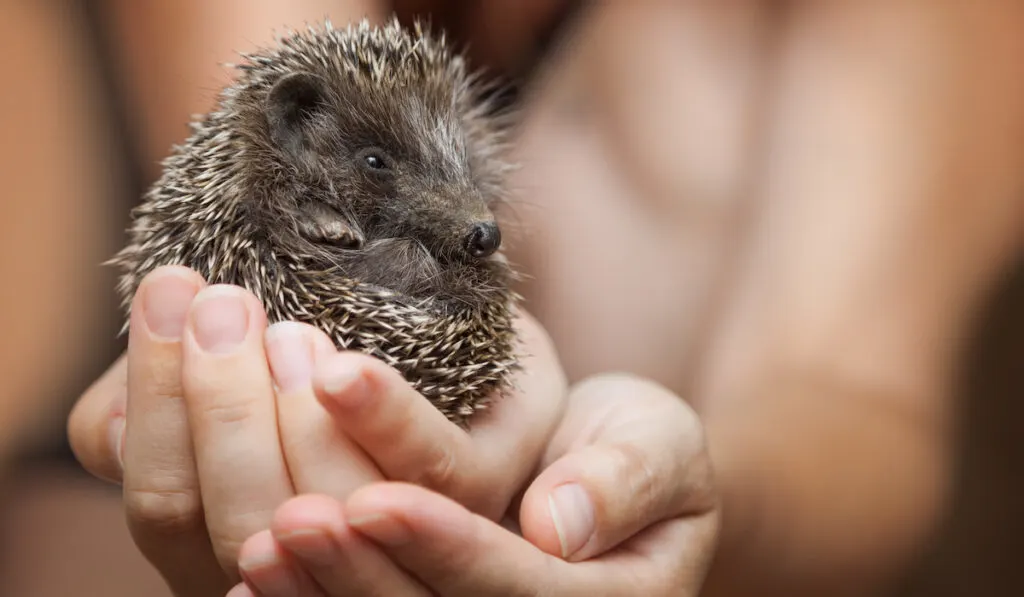Most people will refer to any small animal that scurries around as a rodent. Chances are, you are guilty of this, as well. If it’s small, furry, and likes to chew things, it could be classified as a rodent. Unfortunately, many animals are mislabeled as rodents. The hedgehog is one of those animals.
Is a hedgehog a rodent? A hedgehog is not a rodent; it is a mammal. Many people tend to mistake a hedgehog for a rodent because of its size and similar appearance to a porcupine.

Hedgehogs are becoming a popular pet for many. If you are interested in getting a hedgehog, you need to purchase from a reputable breeder and make sure you provide the hedgehog with proper veterinary care. This article will teach you what a hedgehog is as well as how to best care for them.
Table of Contents
What is a Hedgehog?
A hedgehog is a mammal that is closely related to shrews. Often, people mistake hedgehogs for a small counterpart of the porcupine because of their spike-like hair. While their hair is an adaptation that is used for protection, they aren’t spikes like the porcupines.
The spines of a hedgehog are made of keratin. This is the substance human fingernails are made of. Because of this, the quills don’t easily detach like a porcupine.
When a hedgehog feels threatened, it will roll into a ball. The quills protect the hedgehog from being bitten by a predator.
Many people prefer hedgehogs as pets because of their hypoallergenic nature. They don’t shed like most animals and don’t have dander either. However, it is essential to know the quills can secrete oil that may be bothersome to sensitive skin. Hedgehogs are also touted as having low to no body odor, which makes them an ideal pet to have in your house.
Personality
The personality of a hedgehog is quite different from a rodent. Like any animal, the hedgehog needs to be taught social skills. They are typically handled from a very young age to ensure they know how to interact with humans. Although they may be socialized, they tend to keep to themselves.
Because a hedgehog is nocturnal, most of their days or your waking hours will be spent sleeping. Their active time will be at night when you are trying to go to sleep. This is important to keep in mind if you are considering a hedgehog as a pet.
If your house is quiet all day while everyone is at work or school, the hedgehog may be an ideal pet because of their solitary nature and the need for sleep during the day. While sleeping all day is a benefit for a busy house, you must be prepared to provide exercise to the hedgehog in the evening.
Hedgehog Body

Alina Bradford provides excellent information about a hedgehog’s body in her article, Hedgehog Facts.
- The hedgehog is a relatively small animal and can usually fit into an adult’s hand.
- They are typically 5.5-12 inches long and weigh approximately a pound. The size depends on the type of hedgehog.
- Hedgehogs are also known for their pointy noses and, of course, the small quills covering their body.
- Unlike rodents, hedgehogs can have as many as 44 teeth. They don’t need to gnaw food to keep their teeth short because their teeth don’t continually grow like rodents.
What do Hedgehogs Eat?
Another way a hedgehog differs from a rodent is their diet. Hedgehogs are not as picky as rodents. When it comes to eating, they will eat almost anything. Favorite foods of the hedgehog are insects, frogs, snails, roadkill, and even some plants.

Because hedgehogs have such a vast diet in the wild, their nutritional needs must be met in captivity. This can best be accomplished with a high-quality commercial hedgehog food as well as supplemental crickets and mealworms.
Examples of Food: Each of these foods are highly rated as appropriate for hedgehogs. They contain the necessary vitamins and nutrients to keep your hedgehog happy and healthy.
- Hedgehog Complete – Nutritionally Complete Natural Healthy High Protein Pellets & Dried Mealworms
- Pretty Pets Premium Hedgehog Food
Hedgehog Treats: Most animals like treats and snacks. The hedgehog is no exception. Here are quality snacks to keep your hedgehog happy.
- Sunseed 36035 Vita Prima Hedgehog Treat – Wigglers & Berries Trail Mix
- Treat Assortment 6 Pack – Pet Treat with Mix of Dried Fruits, Yogurt, Dried Insects, & Other Crunchies
It is important to remember that treats do not replace a meal. While the treats are healthy and nutrient-rich, they will not take the place of a proper meal for your hedgehog.
Where do I Find a Hedgehog?
Finding a pet hedgehog can be quite challenging. You may be able to find one at a pet store, but you will likely not be able to find out information regarding the breeder. It is recommended that you seek out a reputable breeder to purchase a hedgehog.
Many states have strict laws regarding the sale of hedgehogs as pets. There are several areas (Georgia, Alabama, Hawaii, Pennsylvania, New York City, Washington D.C.) that have banned the ownership of hedgehogs completely. Some areas operate with restrictions on the ownership of hedgehogs.
This is an excellent video with some tips you should keep in mind before you purchase a hedgehog.
Why Ban Hedgehogs?
You may be wondering why any state or location would consider banning hedgehogs as pets. The main reason is that they have the capability of reproducing in the wild and could potentially cause a problem to local habitats.
For example, in Florida, there is a large population of pythons and iguanas. While they are not indigenous to the area, they have begun to take over the wild.
Unfortunately, many people purchase pets when they are small and easy to care for. As pets become larger and more challenging to care for, many are released into the wild. Because this has been an ongoing cycle, it is becoming a problem. States don’t want the same thing to happen with hedgehogs.
How Much are Hedgehogs?
If you are seriously considering purchasing a hedgehog, you need to know they are not an inexpensive and low maintenance animal. The average cost of a hedgehog is close to $100. This doesn’t include the cage, exercise equipment, bedding, or food.
You also need to be prepared to take your hedgehog to the vet regularly. Like any other pet, there are some illnesses and diseases they are more susceptible to. Receiving frequent check-ups will help prolong the life of your pet
What Diseases Affect the Hedgehog?
According to Rick Axelson, DVM at VCA Pet Hospital, author of, Hedgehogs-Diseases, hedgehogs are prone to the following diseases and illnesses:
- Internal and external parasites
- fleas, ticks and mites
- Ringworm
- Cancer
- Typically with hedgehogs 3 years and older
- Gastrointestinal illnesses
- Pneumonia
To ensure your hedgehog doesn’t contract any of these diseases it is important that you provide the correct veterinary care.
How Long do Hedgehogs Live?
According to Jane Meggitt, author of the article How Long do Domesticated Hedgehogs Live, the life expectancy of a hedgehog depends on its overall health. As a pet owner, you are a huge factor in their quality of life. A healthy hedgehog that is well cared for can be expected to live between 4-7 years.
Final Thoughts
A hedgehog is a unique animal that is likely to make a great pet, if you take the time to care for it properly. Knowing that a hedgehog isn’t a rodent will allow you to prepare for and maintain its lifestyle appropriately. Before getting a hedgehog, make sure it fits with your daily life schedule, that you have the resources to properly care for a hedgehog and most importantly, that it is legal in your state.
